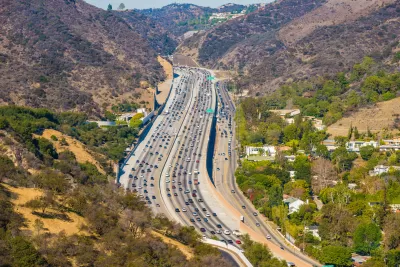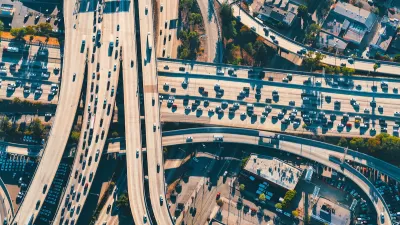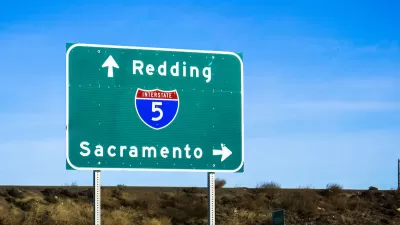If California wants to meet its climate goals, the state must stop funding its myriad road construction and expansion projects.

A new report calls on California to rethink its “traffic-creating, pave-the-earth approach to transportation,” highlighting the environmental and public health impacts of rampant freeway construction.
According to an article by Melanie Curry in Streetsblog California, despite the state’s efforts to support clean air and water policies, the inertia of the status quo and a fear of change “has led to focusing on difficult but politically plausible solutions like electric vehicles, cleaning up the electricity sector, and calling for low-carbon fuels.”
For the authors of the report from NextGen, those efforts are in part a distraction from lower-hanging, but more politically challenging, fruit: “As long as California keeps expanding highways to accommodate driving, all the other efforts - to increase EVs, to produce clean energy, to add bike lanes - will have been a waste of time.”
The report states, “Indeed, if California continues to expand highway capacity, the resulting increase in VMT will overwhelmingly cancel out the climate benefits of mode shift generated through concurrent transit improvements.”
The report suggests some solutions for creating a “smarter and better transportation system” that creates more jobs and improves quality of life and safety. Namely, “California needs to: align transportation funding with climate goals (as called for by the state Climate Action Plan for Transportation Investment, CAPTI); bring transparency and accountability to the project selection process (as attempted with several bills in the past few years that so far have failed to make it through), and improve oversight and rigor in agency analyses of project impacts (also the subject of numerous bills).”
The report also recommends limiting the use of “statements of overriding considerations,” a tool often employed by Caltrans and other transportation agencies to push road expansion projects through at the expense of housing or green space.
FULL STORY: California Has to Stop Building Freeways. Now.

Alabama: Trump Terminates Settlements for Black Communities Harmed By Raw Sewage
Trump deemed the landmark civil rights agreement “illegal DEI and environmental justice policy.”

Planetizen Federal Action Tracker
A weekly monitor of how Trump’s orders and actions are impacting planners and planning in America.

Why Should We Subsidize Public Transportation?
Many public transit agencies face financial stress due to rising costs, declining fare revenue, and declining subsidies. Transit advocates must provide a strong business case for increasing public transit funding.

Understanding Road Diets
An explainer from Momentum highlights the advantages of reducing vehicle lanes in favor of more bike, transit, and pedestrian infrastructure.

New California Law Regulates Warehouse Pollution
A new law tightens building and emissions regulations for large distribution warehouses to mitigate air pollution and traffic in surrounding communities.

Phoenix Announces Opening Date for Light Rail Extension
The South Central extension will connect South Phoenix to downtown and other major hubs starting on June 7.
Urban Design for Planners 1: Software Tools
This six-course series explores essential urban design concepts using open source software and equips planners with the tools they need to participate fully in the urban design process.
Planning for Universal Design
Learn the tools for implementing Universal Design in planning regulations.
Caltrans
Smith Gee Studio
Institute for Housing and Urban Development Studies (IHS)
City of Grandview
Harvard GSD Executive Education
Toledo-Lucas County Plan Commissions
Salt Lake City
NYU Wagner Graduate School of Public Service





























